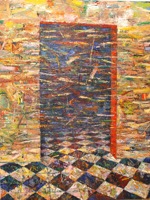Difference between revisions of "Threshold"
m (Text replacement - "http://nordan.daynal.org" to "https://nordan.daynal.org") |
m (Text replacement - "http://" to "https://") |
||
| Line 3: | Line 3: | ||
==Etymology== | ==Etymology== | ||
[https://nordan.daynal.org/wiki/index.php?title=English#ca._1100-1500_.09THE_MIDDLE_ENGLISH_PERIOD Middle English] thresshold, from [https://nordan.daynal.org/wiki/index.php?title=English#ca._600-1100.09THE_OLD_ENGLISH.2C_OR_ANGLO-SAXON_PERIOD Old English] threscwald; akin to Old Norse threskjǫldr threshold, Old English threscan to thresh | [https://nordan.daynal.org/wiki/index.php?title=English#ca._1100-1500_.09THE_MIDDLE_ENGLISH_PERIOD Middle English] thresshold, from [https://nordan.daynal.org/wiki/index.php?title=English#ca._600-1100.09THE_OLD_ENGLISH.2C_OR_ANGLO-SAXON_PERIOD Old English] threscwald; akin to Old Norse threskjǫldr threshold, Old English threscan to thresh | ||
| − | *Date: before [ | + | *Date: before [https://www.wikipedia.org/wiki/12th_Century 12th century] |
==Definitions== | ==Definitions== | ||
*1 : the plank, stone, or piece of timber that lies under a door : sill | *1 : the plank, stone, or piece of timber that lies under a door : sill | ||
| Line 11: | Line 11: | ||
:b : a level, point, or [[value]] above which something is true or will take place and below which it is not or will not | :b : a level, point, or [[value]] above which something is true or will take place and below which it is not or will not | ||
==Description== | ==Description== | ||
| − | Sensory '''threshold''' is a [[theoretical]] [[concept]] used in [ | + | Sensory '''threshold''' is a [[theoretical]] [[concept]] used in [https://en.wikipedia.org/wiki/Psychophysics psychophysics]. A [[stimulus]] that is less [[intense]] than the ''sensory threshold'' will not elicit any [[sensation]]. [[Methods]] have been [[developed]] to [[measure]] thresholds in any of the [[senses]]. |
Several [[different]] sensory thresholds have been defined; | Several [[different]] sensory thresholds have been defined; | ||
| − | * [ | + | * [https://en.wikipedia.org/wiki/Absolute_threshold ''Absolute threshold'']: the lowest level at which a stimulus can be detected. |
* ''Recognition threshold'': the level at which a stimulus can not only be detected but also recognised. | * ''Recognition threshold'': the level at which a stimulus can not only be detected but also recognised. | ||
| − | * [ | + | * [https://en.wikipedia.org/wiki/Just_noticeable_difference ''Differential threshold'']: the level at which an increase in a detected stimulus can be [[perceived]]. |
* ''Terminal threshold'': the level beyond which a stimulus is no longer detected. | * ''Terminal threshold'': the level beyond which a stimulus is no longer detected. | ||
Latest revision as of 02:41, 13 December 2020
Etymology
Middle English thresshold, from Old English threscwald; akin to Old Norse threskjǫldr threshold, Old English threscan to thresh
- Date: before 12th century
Definitions
- 1 : the plank, stone, or piece of timber that lies under a door : sill
- 2 a : gate, door
- b (1) : end, boundary; specifically : the end of a runway (2) : the place or point of entering or beginning : outset <on the threshold of a new age>
- 3 a : the point at which a physiological or psychological effect begins to be produced <has a high threshold for pain>
- b : a level, point, or value above which something is true or will take place and below which it is not or will not
Description
Sensory threshold is a theoretical concept used in psychophysics. A stimulus that is less intense than the sensory threshold will not elicit any sensation. Methods have been developed to measure thresholds in any of the senses.
Several different sensory thresholds have been defined;
- Absolute threshold: the lowest level at which a stimulus can be detected.
- Recognition threshold: the level at which a stimulus can not only be detected but also recognised.
- Differential threshold: the level at which an increase in a detected stimulus can be perceived.
- Terminal threshold: the level beyond which a stimulus is no longer detected.
Aviation use
When related to motion in any of the possible six degrees of freedom (6-DoF), the fact that sensory thresholds exist is why it is essential that aircraft have blind-flying instruments. Sustained flight in cloud is not possible by `seat-of-the-pants' cues alone since errors build up due to aircraft movements below the pilot's sensory threshold, ultimately leading to loss of control.
- In flight simulators with motion platforms, the motion sensory thresholds are utilised in the technique known as `acceleration-onset cueing'. This is where a motion platform, having made the initial acceleration that is sensed by the simulator crew, the platform is re-set to approximately its neutral position by being moved at a rate below the sensory threshold and is then ready to respond to the next acceleration demanded by the simulator computer.
